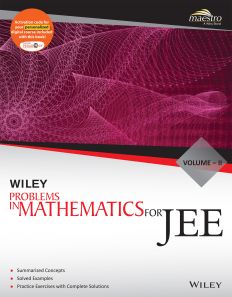Wiley's Problems in Mathematics for JEE, Vol II
ISBN: 9788126541850
664 pages
For more information write to us at: acadmktg@wiley.com

Description
Wiley Mathematics Problem Book covers the complete mathematics course for JEE. It is focused on the development of problem-solving skills in JEE aspirants. The chapter flow of the book is closely aligned with the JEE (Main) syllabus and its coverage in the classroom. However, the topics required for JEE (Advanced) are also covered. The problems presented systematically cover all important concepts pertaining to the topic and the possible questions that can be framed on them.
Note to the Student
Chapter 17 Inverse Trigonometry
17.1 Introduction
17.2 Domain and Range of Inverse Trigonometric Functions
17.3 Properties of Inverse Trigonometric Functions
17.4 General Values of Inverse Circular Functions
Chapter 18 Limit, Continuity and Differentiability
18.1 Limit of a Function
18.2 Definition
18.3 Algebra of Limits
18.4 Evaluation of Limits
18.5 Use of Standard Limits
18.6 Some More Standard Forms
18.7 Use of Expansion
18.8 L’Hospital’s Rule
18.9 Sandwich Theorem (Squeeze Play Theorem)
18.10 Continuity
18.11 Differentiability
Chapter 19 Differentiation
19.1 Introduction
19.2 Differentiation from First Principle
19.3 Derivatives of Some of the Frequently Used Functions
19.4 Rules to Find Out Derivatives
19.5 Derivative of Second Order ’’ or 2
19.6 Differentiation of a Function with Respect to Another Function
Chapter 20 Applications of Derivatives
20.1 Geometrical Interpretation of Derivative
20.2 Tangent and Normal
20.3 Angles Between Two Curves
20.4 /as Rate Measures
20.5 Errors and Approximations
20.6 Monotonicity of Function
20.7 Maxima and Minima of Functions of a Single Variable
20.8 Mean Value Theorems
20.9 Geometrical Problems
Chapter 21 Indefinite Integration
21.1 Primitive or Anti-Derivative of a Function
21.2 Indefinite Integral and Indefinite Integration
21.3 Methods of Integration
21.4 Integration by Partial Fractions
Chapter 22 Definite Integration
22.1 Definition
22.2 Geometrical Meaning of Definite Integration
22.3 Definite Integration as the Limit of Sum
22.4 Properties of Definite Integration
22.5 Properties Based on Periodic Function
22.6 Properties Based on Inequality
22.7 Newton–Leibnitz Rule
22.8 Summation of Series by Integration
22.9 Reduction Formulae for Definite Integration
22.10 Wallis Formulae
Chapter 23 Area Under the Curves
23.1 Curve Tracing
23.2 Steps to Draw Curve
23.3 Area of Bounded Region
23.4 Area Enclosed Between Two Curves
Chapter 24 Differential Equations
24.1 Introduction
24.2 Basic Definition
24.3 Order of a Differential Equation
24.4 Degree of a Differential Equation
24.5 Formation of a Differential Equation
24.6 Solution of a Differential Equation
24.7 Differential Equations of First-Order and First-Degree
24.8 Solution of First-Order and First-Degree Differential Equations
24.9 Variable Separable Type Differential Equation
24.10 Equation Reducible to Variable Separable Type Differential Equation
24.11 Homogeneous Type Differential Equation
24.12 Non-Homogeneous Type Differential Equation
24.13 Exact Differential Equation
24.14 Linear Differential Equation
24.15 Solution of Differential Equation of the First Order but of Higher Degree
24.16 Applications of Differential Equation
Chapter 25 Vector Algebra
25.1 Introduction
25.2 Representation of a Vector
25.3 Types of Vectors
25.4 Rectangular Resolution of Vectors (Orthogonal System of Vectors): Resolution of a Vector in Two Dimensions
25.5 Resolution of a Vector in Three Dimensions
25.6 Properties of Vectors
25.7 Fundamental Theorems of Vectors
25.8 Linear Combinations of Vectors
25.9 Linearly Dependent and Independent Vectors
25.10 Position Vector of a Dividing Point (Section Formulae)
25.11 Bisector of the Angle Between Two Vectors
25.12 Product of Two Vectors
25.13 Scalar or Dot Product of Two Vectors
25.14 Vector or Cross-Product of Two Vectors
25.15 Scalar Triple Product
25.16 Vector Triple Product
25.17 Scalar or Vector Product of Four Vectors
25.18 Method to Prove Collinearity
25.19 Vector Equation
Chapter 26 Three-Dimensional Geometry
26.1 Rectangular Coordinate System in Space
26.2 Other Methods of Defining the Position of Any Point P in Space
26.3 Shifting the Origin
26.4 Distance Formula
26.5 Section Formula
26.6 Triangle and Tetrahedron
26.7 Direction Cosines of a Line
26.8 Direction Ratios
26.9 Projection of a Line
26.10 Equation of a Straight Line in Space
26.11 Angle Between Two Lines
26.12 Intersections of Two Lines
26.13 Shortest Distance Between Two Non-intersecting Lines
26.14 Point and Line
26.15 The Plane
26.16 Equation of Plane in Different Forms
26.17 Point and Plane
26.18 Angle Between Two Planes
26.19 Angle Bisectors of Two Planes
26.20 Family of Plane
26.21 Line and Plane
26.22 Sphere
Chapter 27 Probability
27.1 Introduction
27.2 Concept of Probability in Set Theoretic Language
27.3 Definition of Probability with Discrete Sample Space
27.4 Axiomatic Definition
27.5 Basic Theories
27.6 Conditional Probability
27.7 Independent Events
27.8 Total Probability
27.9 Bayes’ Theorem or Inverse Probability
27.10 Random Variable and Probability Distribution
27.11 Binomial Distribution
27.12 Poisson Distribution
27.13 Probability of Events in Experiments with Countable Infinite Sample Space
27.14 Important Information
Chapter 28 Statistics
28.1 Frequency Distribution
28.2 Measure of Central Tendency
28.3 Measure of Dispersion
28.4 Symmetric and Skew-Symmetric
Additional Solved Examples
Previous Years’ Solved JEE Main/AIEEE Questions
Practice Exercise 1
Practice Exercise 2
Answer Key
Solutions
Solved JEE 2017 Questions
Appendix: Chapter-wise Solved JEE 2018 and JEE 2019 Questions




